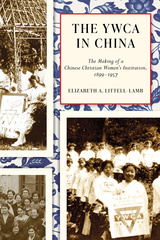
The Sino-Japanese War (1937–45) had a devastating impact on China’s civilian population. Braving bandits, disease, and dangerous roads, the China Convoy – a Quaker-sponsored humanitarian unit and a forerunner of Médicins Sans Frontières – delivered medical supplies and provided famine relief at a hinge point in the development of the modern Chinese nation and humanitarian system.
China Gadabouts examines the contested roles played by Western and Chinese nurses in the Convoy’s humanitarian efforts from 1941 to 1951. In so doing, it re-examines the quandaries of Quakers’ purportedly apolitical global engagement that remain salient for contemporary humanitarians. Susan Armstrong-Reid explores how this work gave meaning to the women’s lives and how they attempted to carve out personal and professional space despite a chaotic, unfamiliar, and occasionally hostile environment. Despite their contributions in challenging wartime conditions, these women’s role in the global humanitarian enterprise has been undervalued. Through an array of letters, diary entries, and other materials, this book provides first-hand perspectives on the intersections of power with faith, gender, class, race, and nation that shaped the nurses’ work and life in the field.
China Gadabouts illuminates the ethical dilemmas, professional challenges, and opportunities presented by humanitarian nursing within a Western-based relief organization, while acknowledging its contentious imperial role. It also spotlights an understudied area of global nursing – its role within INGOs, now more active than ever, in global health care.
This book will find an audience with practitioners as well as students and scholars of global nursing history, humanitarian history, the history of medicine, and the Sino-Japanese War and the Chinese civil war.
Awards
- 2018, Winner - Lavina L. Dock Award, American Association for the History of Nursing
The book contributes in an interesting and valuable way to the history of nursing by women in faith.
Armstrong-Reid finds the ‘silenced’ voices of nurses, both women and men, Western and Chinese, in a variety of sources and texts – diaries, memoirs, letters, and more. I know of no other book on the history of humanitarian nursing in China that does this. Nursing history needs more like China Gadabouts.
Introduction
Part 1: From Regional War to Global War, 1941–45
Introduction to Part 1
1 Trial by Fire: Early Field Operations, 1941–42
2 A Marriage of Convenience: Courting the Chinese Nurses, 1942–43
3 The Salween Campaign: Humanitarian Diplomacy, 1944–45
4 “China Needs Good Men, and Still Better Women,” British Nurses, 1943–44
5 Baoshan: Professionalism, Pacifism, and Proposals, 1944–45
Part 2: Navigating New Humanitarian Frontiers, 1945–51
Introduction to Part 2
6 The Road to Honan: Plagues, Cholera, and Devilish Devolutions, 1944–45
7 Henan: Hope and Despair, 1945–47
8 “Early Team”: Guerrilla Warfare Nursing, 1946–47
Part 3: Unwelcome Visitors: Negotiating Access with The Communists, 1947–51
Introduction to Part 3
9 Nursing beyond the Trenches, 1947–50
Conclusion: Nurse Warriors without Weapons
Notes; Bibliography; Index











